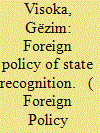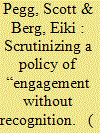| Srl | Item |
| 1 |
ID:
160773


|
|
|
|
|
| Summary/Abstract |
This paper explores and explains the EU’s use of sanctions in response to the Arab Spring in 13 Middle East and North Africa (MENA) states. A Qualitative Comparative Analysis (QCA) shows that a combination of historical factors and human rights violations contributed to the EU’s decision to impose sanctions in Libya and Syria, while transitional void seems to have been the most important trigger for sanctions in Egypt and Tunisia. The absence of both transitional void and historical economic coercion explains why the EU has refrained from imposing sanctions in negative cases such as Saudi Arabia and Bahrain. Exposing the complex causality of the EU’s Arab Spring sanctions, this paper nuances the EU’s self-proclaimed normative foreign policy approach and demonstrates that combinations of factors matter for explaining the EU’s decision to invoke sanctions in the MENA region.
|
|
|
|
|
|
|
|
|
|
|
|
|
|
|
|
| 2 |
ID:
160769


|
|
|
|
|
| Summary/Abstract |
Confronting a more powerful rival can be a risky proposition. This paper integrates prospect theory into the growing Neoclassical Realist (NCR) literature to identify the conditions under which decision makers are most likely to accept foreign policy risks. I argue that decision makers governing regimes with low levels of political counterframing are more likely to settle into a dominant loss frame when their external security environment erodes. This increases the probability that they will initiate disputes with more powerful adversaries. To assess this proposition, I conduct a test of weaker state confrontation grounded in a NCR framework that utilizes the insights from prospect theory. Data come from the postwar era and support my hypothesis. Loss frames exert influence over the decision to initiate risky foreign policy strategies in regimes in which political counterframing is absent.
|
|
|
|
|
|
|
|
|
|
|
|
|
|
|
|
| 3 |
ID:
160774


|
|
|
|
|
| Summary/Abstract |
Public opinion surveys on American foreign policy often elicit many “don’t know” or “no opinion” responses. Researchers have paid surprisingly little attention to these responses, typically dropping them from their analyses or suppressing them in the survey design. We argue that these practices lead to potentially misleading conclusions about both the level of support for particular foreign policies and the determinants of individual attitudes. We demonstrate these problems using an original survey experiment testing the effect of including a DKNO option on three common questions about international trade, the use of force, and isolationism. Our findings also suggest that taking DKNO responses more seriously in our analyses provides a richer sense of the process through which important covariates actually influence attitudes.
|
|
|
|
|
|
|
|
|
|
|
|
|
|
|
|
| 4 |
ID:
160771


|
|
|
|
|
| Summary/Abstract |
This article explores the policies and activities undertaken by Kosovo as it seeks diplomatic recognition under conditions of contested statehood and transitional international order. Existing debates about diplomatic recognition—in particular, how independent sovereign statehood is achieved—generally rest upon systemic factors, normative institutions, and the preferences of great powers. In contrast, we argue that the experience of Kosovo presents a more complex and less predetermined process of international recognition, in which the agency of fledgling states, diplomatic skill, timing, and even chance may play a far more important role in mobilizing international support for recognition than is generally acknowledged. In building this argument, we explore Kosovo’s path to contested independence and examine the complex process of diplomatic recognition, as well as highlight the hybrid justifications for recognizing Kosovo’s statehood and independence. Without downplaying the importance of systemic factors, this article contributes to a critical rethinking of norms and processes related to state recognition in international affairs, which has implications for a broad range of cases.
|
|
|
|
|
|
|
|
|
|
|
|
|
|
|
|
| 5 |
ID:
160770


|
|
|
|
|
| Summary/Abstract |
Why do some diaspora groups, but not others, play a prominent role in the formalization of cooperative political ties between their country of origin and their country of residence? This article adopts a novel dyadic approach to the study of diaspora politics by arguing that diaspora politics are simultaneously structured by regime type in the country of origin and in the country of residence. Diaspora groups can play a prominent role in the formalization of cooperative foreign policy ties between their country of origin and their country of residence in democracy–democracy dyads (i.e., when the country of origin and the country of residence are both democratic). In all other dyads (including authoritarian–authoritarian), diaspora groups’ political impact on the formalization of cooperative foreign policy ties tends to be limited. The democracy–democracy dyad approximates a necessary (but not a sufficient) condition; nationalism and international economic strategies adopted by the country of origin help shape diaspora politics. This article examines all four regime type dyads by focusing on diaspora politics in authoritarian Malaysia and democratic United States, which have notable populations of Chinese and of Indian origin.
|
|
|
|
|
|
|
|
|
|
|
|
|
|
|
|
| 6 |
ID:
160772


|
|
|
|
|
| Summary/Abstract |
De facto states are conventionally perceived as illegal entities, usually ignored by the rest of the world and therefore also isolated and severely sanctioned in most cases. We investigate US foreign-policy engagement with Abkhazia, Nagorno-Karabakh, Northern Cyprus, Somaliland, and Transnistria and explore when, why, and how interactions between the United States and “places that do not exist” has taken place. This is done by extensively using WikiLeaks diplomatic cables from 2003– to 2010 as a primary information source. We assume that by engaging and not recognizing, the US has sought to increase its leverage and footprint in conflicts that somehow affect its national interests. This engagement approach is presumably most successful when targeted adversaries turn out to be agents of peace and stability, or when strategic calculus outweighs the rationale for the conventional treatment of sovereign anomalies.
|
|
|
|
|
|
|
|
|
|
|
|
|
|
|
|
| 7 |
ID:
160768


|
|
|
|
|
| Summary/Abstract |
This study examines a government’s decision to cede authority over fundamental questions of policy to international organizations. Explanations for delegation to international institutions focus on the benefits of “locking in” domestic political institutions and signaling intentions to the public. This line of reasoning suggests that partly democratic and democratizing governments have the strongest incentive to participate in international human rights institutions. I evaluate this claim by analyzing patterns of participation in two regional human rights courts: the European Court of Human Rights and the Inter-American Court of Human Rights. The decision to join a regional court is a more valid indicator of delegation than those used in previous empirical studies and to date has not been examined in systematic fashion. I find strong evidence in support of the claim that governments grant authority to institutions to credibly commit to maintaining democracy.
|
|
|
|
|
|
|
|
|
|
|
|
|
|
|
|